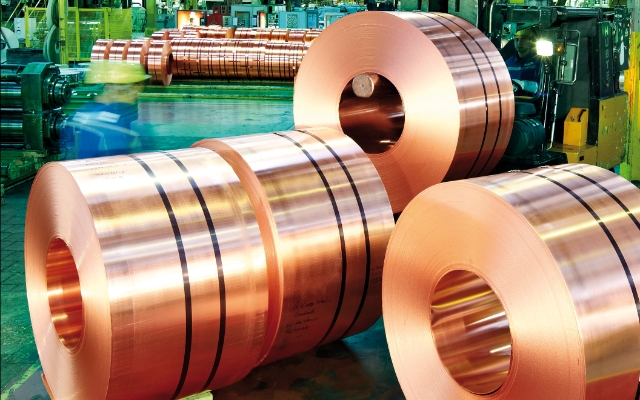Uncovering the Wellness Perks of Using Copper Products in Everyday Life
Uncovering the Wellness Perks of Using Copper Products in Everyday Life
Blog Article
Discovering the Diverse Applications of Copper Products in Modern Industries
Copper items have actually established themselves as crucial elements throughout a myriad of contemporary markets, mostly due to their impressive conductivity, malleability, and resistance to corrosion. From boosting the effectiveness of electrical systems to playing a vital role in renewable resource technologies, the convenience of copper is apparent. Its recyclability placements it as a lasting option in manufacturing and electronic devices. As markets progressively prioritize advancement and sustainability, the diverse applications of copper necessitate a closer assessment, specifically concerning their prospective impact on future ecological practices and technical developments.
Electrical Applications of Copper
Copper is a vital product in the electric industry, accounting for around 60% of the total demand for non-ferrous metals around the world - Copper Products. Its remarkable electric conductivity, which is virtually two times that of aluminum, makes it the preferred selection for a vast array of electrical applications. From wiring systems in commercial and domestic buildings to high-voltage power transmission lines, copper makes sure effectiveness and reliability in power shipment
Along with circuitry, copper is indispensable to the production of electric parts such as transformers, generators, and electric motors. These parts utilize copper's thermal conductivity and pliability, necessary for heat dissipation and effective efficiency. Copper's resistance to deterioration boosts the life expectancy and sturdiness of electrical systems, making it a cost-effective option in the lengthy term.
The growth of renewable resource resources, such as solar and wind power, has actually further raised the demand for copper in electric applications. As markets shift towards lasting energy remedies, copper's duty ends up being a lot more critical. Generally, the convenience and efficiency attributes of copper solidify its standing as a cornerstone material within the electrical field, driving development and performance across different applications.
Pipes and Piping Solutions
In modern-day pipes systems, the choice of materials significantly affects both capability and long life. Copper has actually become a favored alternative as a result of its one-of-a-kind buildings, including rust resistance and antimicrobial features. These attributes make sure that copper piping remains safe and resilient for carrying potable water, a crucial consideration in property and business applications.
Among the vital advantages of copper in plumbing is its capability to hold up against heats and pressures, making it suitable for a selection of applications, from hot water systems to heating and cooling down networks. In addition, copper's adaptability enables for simpler setup in complex piping formats, decreasing the threat of failings and leakages.
Another noteworthy advantage is copper's long life-span, often going beyond half a century with correct upkeep. This durability not just decreases substitute expenses however also adds to sustainable methods by minimizing waste. Copper's recyclability straightens with modern environmental standards, advertising a round economy within the pipes market.
Copper in Renewable Resource
The adaptability of copper prolongs beyond plumbing applications, playing an essential function in the eco-friendly power field. In solar panels, copper is used in photovoltaic cells and electrical wiring, facilitating effective energy conversion and transmission.

Furthermore, as the international need for electric cars (EVs) boosts, copper's role in battery systems and billing framework ends up being a lot more significant. The product's ability to perform electrical energy effectively is important to the efficiency of EV batteries, boosting variety and charging speed.
Copper's Role in Electronic devices
Electronics producing counts greatly on copper's phenomenal properties, specifically its high electrical conductivity and thermal performance. These attributes make copper an optimal choice for a vast array of digital components, consisting of adapters, circuit card, and wiring. The steel's capacity to successfully transfer electrical signals makes certain very little energy loss, which is vital in high-performance digital gadgets.
Additionally, copper's thermal conductivity plays a significant duty in warm dissipation, shielding sensitive elements from overheating. This is especially crucial in modern electronic devices, where compact layouts bring about enhanced warmth generation. Copper is likewise favored for its pliability and ductility, allowing it to be easily shaped into intricate styles that fulfill the demands of sophisticated electronic applications.
With the rise of consumer electronic devices, telecoms, and electrical vehicles, the demand for copper in the electronics field proceeds to grow. Hence, copper continues to be a keystone product in the ever-expanding field of electronic devices.
Ingenious Uses in Manufacturing

One significant application remains in additive manufacturing, where copper-based materials are utilized in 3D printing procedures. This permits the production of complex geometries and light-weight components, particularly in the aerospace and vehicle industries. Additionally, copper's thermal conductivity makes it a perfect selection for warmth exchangers, improving efficiency in industrial air conditioning systems.
Moreover, the surge of wise production has seen the unification of copper in IoT tools, where its conductive capabilities support advanced sensing innovations. In the realm of sustainable energy, copper is pivotal in the manufacturing of solar panels and wind turbines, facilitating more reliable power conversion and distribution.
As industries strive for sustainability and innovation, copper's adaptability and efficiency continue to position it as a vital product, driving developments in production and adding to the development of smarter, more effective products.
Conclusion
The integral function Website of copper in sustainable energy and its important function in electronic devices emphasize its relevance in advancing lasting methods. Jointly, these applications show copper's critical payment to technical development and industrial performance in contemporary culture.
From improving the effectiveness of electrical systems to playing a crucial function in eco-friendly energy innovations, the versatility of copper is evident. As sectors increasingly focus on advancement and sustainability, the diverse applications of copper warrant a closer exam, especially regarding their potential impact on future technical improvements and environmental techniques.
The development of sustainable power sources, such as solar and wind power, has actually even more increased the need for copper in electrical applications. In general, the convenience and performance features of copper solidify its standing as a cornerstone product within the electric market, driving advancement and efficiency throughout various applications.
The adaptability of copper expands beyond pipes applications, playing an important duty in the renewable power field.
Report this page